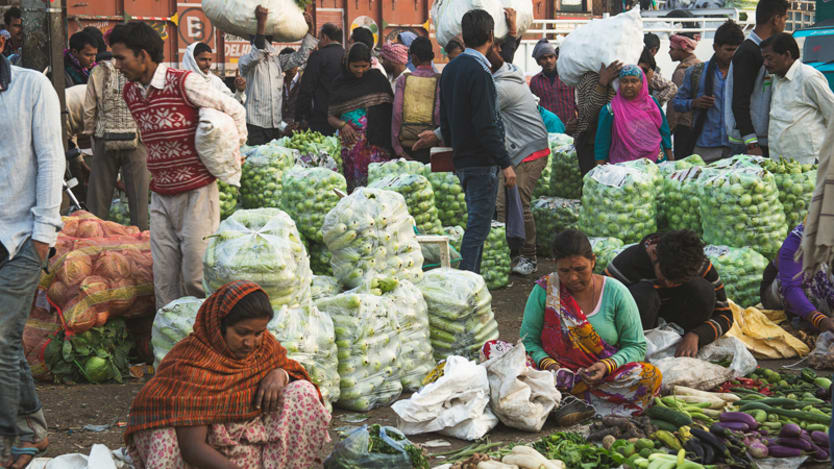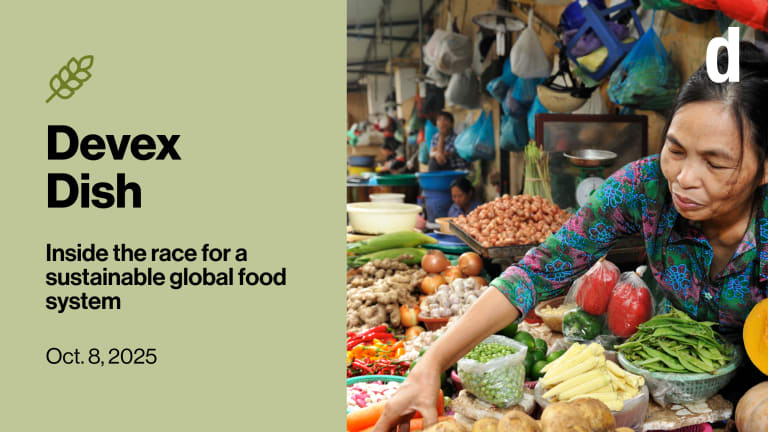
DUBAI — It sounds like science fiction, but it’s happening now: growing meat in a laboratory. And it’s just one potential piece of a complex puzzle that food and agriculture experts are trying to solve.
Two dozen experts gathered in Dubai for the World Economic Forum’s Annual Meeting of the Global Future Councils, focused on solving some of the most difficult challenges facing the world. Over several hours of discussion (which I facilitated on behalf of the forum), we considered what the world’s food system might look like by 2030 and how it could possibly contribute to human health without harming the environment.
As Devex recently reported, while many Sustainable Development Goals show progress — or at least promise with 13 years left before the 2030 deadline — food is presenting a difficult problem. Nearly every country in the world is heading the wrong direction on nutrition, with obesity increasing nearly everywhere, including in countries still suffering from significant undernutrition. Just under half of under 5 mortality is driven by poor nutrition.
And the food system leading to those nutrition problems is also responsible for massive water usage and as much as one-third of greenhouse gas emissions. Consider the health, energy, employment, water, and climate goals: all have a direct connection to the food system.
So what can be done so that children beginning school today might graduate in 2030 into a world where no one suffers from stunting or wasting due to a lack of nutrition (a condition that currently impacts nearly half of all children in India, for example)? And what can be done so that obesity and its related diseases such as diabetes don’t ravage countries as their economies grow?
One clear takeaway from the WEF sessions is that there is no single solution or technology or regulation that will turn the tide. Instead, the entire food system must be turned on its head, from a model that incentivizes agricultural yields and maximizes profits to one that prioritizes human health, local employment, and environmental outcomes.
That might be a compelling vision, but it’s not one that leads to an obvious execution plan. Experts sketched out what they’d like to see more and less of: more local production of diverse foods, less waste and loss of food, water, and land; more local employment opportunities, less carbon emissions from intensive agriculture. But the way forward was much less clear.
Among the ideas generated by the group was to focus more on cities as the key unit of change. That’s because city governments, in many places, face fewer governance challenges than national governments and can make bolder and faster decisions. It’s also because of the fast-growing interest in and commercialization of urban agriculture, including vertical farms, which can allow for localized and diverse food production. And because cities might look quite different after 2030, especially if individual car ownership becomes a historical relic, opening up large areas currently used for parking to food production and distribution.
Some suggested that a combination of behavior change campaigns (targeting junk foods and overeating, for example) and meat alternatives could play a key role. With rapid economic growth in countries such as India and China, demand for meat could balloon by 2030. And because meat production is highly inefficient, using large amounts of water and grain, and is one of the main drivers of greenhouse gas emissions, reducing meat consumption may be a critical step. Encouraging alternative proteins — including synthetic meats, which are currently extremely expensive but might one day become affordable — could be part of the solution.
Technology holds tremendous promise for reimagining the food system, for example solar and microgrid technologies could allow for more localized food production where electricity for irrigation pumps and refrigeration is not currently available. But the ongoing controversy over genetically modified organisms has put those who would support bioengineered approaches in a bind: they see a deficit of trust, not innovation, as their main constraint.
One way to build more trust into the food system — and to provide consumers with information beyond price and calories — could be to make individual food products traceable. New technologies, including ubiquitous and cheap internet connectivity via satellites, smartphones, and blockchain could make it possible for an apple, for example, to be individually identified, right down to the tree it was grown on, the fertilizers and pesticides used, and its impact on the local economy. And if consumers knew that each apple required 25 gallons of water to grow, we might be more concerned about ensuring it’s not wasted.
Even with all the promise of new technologies and approaches, one thing clear from the future-oriented discussions at the WEF event is that with nearly 800 million people living in hunger, a new food system is both a long-term goal and an urgent need. And without faster progress, food could be the single thread that unravels the SDGs.
Read more Devex coverage on food security and nutrition.








